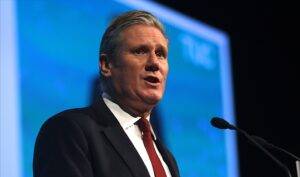
Labour is having to turn away business leaders who want to attend special events at its party conference in Liverpool next month because too many have applied in the belief that Keir Starmer will form the next government.
Party insiders say that a full complement of 200 senior business people have signed up at a cost of £2,520 each to attend a special business forum on the Monday of the conference with Starmer, shadow chancellor Rachel Reeves and shadow business secretary Jonathan Reynolds.
Another 180 have been put on a waiting list and will only be able to attend if others drop out. Last year only 130 attended.
In a rush of interest that has taken officials by surprise, a total of 300 chief executives and chairs of big UK companies will be attending the conference – more than did so during the first term of Tony Blair’s prime ministership. Business sponsorship has more than doubled since last year, when it totalled £200,000, to £500,000 this year, officials say.
Evidence that business is fully expecting a Labour government comes as corporate interest in the Tories slumps, with many consultancies and other companies turning their attentions away from lobbying the Conservatives to trying to make contacts with Labour. One head of a London-based consultancy said: “I think it will be pretty dead at the Tories’ [conference]. People will spend their money on who they think will be the next government.”
While many business leaders are yet to be entirely convinced by Labour’s policy agenda – with many wanting it to go further and faster in addressing the damage caused by Brexit – there is strong interest in the party’s green prosperity plan that aims to learn from the Biden administration through public-private partnership in building a new green economy.
Joe Biden’s $369bn (£296bn) Inflation Reduction Act, directed at zero-carbon energy projects such as solar, wind and nuclear, involves giving huge grants to bring manufacturers of renewable energy products to the US, as well as consumer incentives for purchasing electric vehicles (EVs), heat pumps and electric stoves.
Labour’s green prosperity plan, led by shadow net zero secretary Ed Miliband, draws on elements of Biden’s strategy, using the power of the state to work with businesses to invest in the industries and resources necessary to achieve net zero, with the aim of bringing down energy prices through the use of more renewable energy and creating hundreds of thousands of jobs in the process.
Like the Biden approach, Labour would launch itself on a new course, using state resources, including regulation and subsidies, to attract industries to co-invest with the public sector in technologies for renewable power, the production of EVs and heat pump installation.
One senior figure in the renewable energy field who will be attending the Labour conference said: “The feeling in the industry is that we are just seeing out time with the Tories. They have shown that they are not really committed to the agenda. For Labour, it is central to their economic plans.”
Labour has also had to find five new overspill areas within the conference centre in recent weeks for businesses’ stalls after high levels of demand. So far, 287 organisations have applied for space for their exhibits, which is believed to be a record. The party has also decided to stage a special business conference in February in London.
Speaking to the Observer, Reynolds said that interest in Labour from business was huge, with companies having given up on the Tories.
They were, he said, interested in his party’s industrial strategy, which included targets such as “making Brexit work”, reforms to planning to allow more houses to be built, and changes to the apprenticeship levy, enabling companies to spend up to 50% of their levy contributions on non-apprenticeship training.
This weekend sees the opening of the TUC conference in Liverpool, where unions will demand more action from the government to solve the Raac (reinforced autoclaved aerated concrete) crisis in schools and other public buildings and put pressure on a future Labour government to look again at plans for a wealth tax in order to better fund public services.
Christina McAnea, general secretary of Unison, the country’s largest union, which represents more than 1.3 million workers, said that in the light of the school concrete crisis and erosion of other parts of the public realm, the next government had to show a different attitude to the funding of public services.
“I hope and believe that is where Labour is … that they don’t always think that you have to go out and cut and slash public services.
“We want the next government to see that public services are a good thing in themselves and are not a drain on society – that good public services help build an economy, build a community, and help people go out to work and businesses to thrive.”
Read more:
UK bosses flocking to Labour conference as business walks away from Tories






